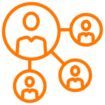
This is a message from me to everybody who faces the same mental challenges as I do and I believe that we amount to whole armies similar to those under the command of Gherkins Han.
This is a problem that a lot of people struggle with, more than you expect.
In this blog, what we talk about a lot is healthy and beneficial habits that someone can cultivate in order to achieve success in the domains that they desire to succeed. Success can differ from person to person, and so do the goals among people, as well as their habits, although we can see that in the ranks of successful people, we can see that many similar habits have been adopted among these people. Success is not a random event that happens for no reason, overnight. The definition of success is subjective. Success is the end-result of a set of habits, chained with long-term consistency.
I believe that when we hear the word ‘habit’, our minds tend to think of practicality. According to this statement, a few examples of good habits are:
- working out
- eating healthy
- sleeping early for 7 to 8 hours daily
A lot of times what we fail to take into consideration is the importance of mental habits. Mental habits are the `practices` that we frequently exert internally, either consciously or subconsciously. The difference is that if we do it subconsciously, it is instilled into us by the external environment, be it family and/or school, from childhood, while if a mental habit is being practiced consciously, we do it intentionally, while being totally aware of it. Some examples of mental habits can be:
- meditating
- our personal view on luck and how it works
- staying calm under stressful situations
The ability to upgrade yourself on any level starts with your mind. Mental habits can be more important than `physical` habits, since the former are responsible for starting and maintaining the latter ones long-term. Mental habits lay the foundation for `physical` habits to be rooted.
To have a clean diet for a long time requires having a mental habit about food, the way you view it and its utility for you, to be more precise. Having a mental habit for long enough makes it part of your mindset. Having discipline is a mental habit. Likewise, being consistent with something that you do can be considered a mental habit.
One of the most beneficial Mental Habits to adopt
While the mental habits mentioned above can be extremely important to have, I am going to refer below one of the biggest mental habits that can seriously protect your inner peace and peace of mind, given that you are determined to incorporate it in your mindset. Are you ready? It goes like this: stop taking things personally (in case you do, like me). Do a huge favor to yourself and at least start living like nothing that happens to you is to be taken personally. Keep that in mind, apply my advice and your future self will be extremely grateful to you for doing that.
It is easier said than done but a good way to start `doing the reps` from today, which will help you stop internalizing other people ‘s issues is to start cultivating empathy. Other people have problems too that they try to solve. Everybody is fighting their own battles, for which almost the rest of the world knows nothing about. This is why I believe that we should be kind to people, no matter what.
What You Can Do, Starting From Today
I will give you an example of the way I use step by step, in order to stop myself from taking things personally, when negative incidents happen in my life. Recently, I accidentally pissed off my supervisor at work and he lashed out at me. At first I can not say that it bothered me but after a while, while I was returning to a state of neutral emotional state, I tried to see things from his point of view.
1) Ask Yourself Why The Person Who Offended You Has A Problem With You
According to his judgement, the reason he got angry is that I asked a question which I should not have done because I should already know the answer and I was wasting precious time at that time, being under pressure.
2) Step Into The `World` Of Your Offender
Furthermore, my supervisor has a very responsible position which forces him to deal with a variety of stressful situations and with a big number of staff to manage.
3) Practice Proactivity
While I can not control the behavior of anyone, what is in my control is my response to negative behaviors like the one mentioned above. I know that not taking things personally can not be automated, especially at the start. With practice, it can surely be attainable.
4) Remind Yourself Of The Statement Below (Depending On Your Situation)
Not everything has to do with you. Your supervisor being pissed at work and lashing out on you probably does not have to do with you, although it may seem like it does. It has to do with how they handle their emotions, errors and difficulties while on duty.
Conclusion
Developing strong mental habits is just as crucial—if not more so—than building physical ones. While actions like eating healthy and working out contribute to success, the mindset behind these choices is what sustains them long-term. The habit of not taking things personally can be a game-changer in protecting your inner peace and maintaining emotional stability. By practicing empathy and understanding that others are fighting their own battles, you gain the ability to respond to challenges with clarity and composure. Start today—train your mind, cultivate resilience, and watch how it transforms every aspect of your life.

